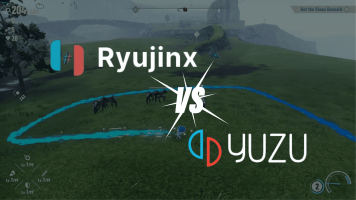Hades II stars Melinoe, sister of Hades protagonist Zagreus and the daughter of the titular god. Unlike the first game, in which Zagreus attempted to escape the underworld in search of his human mother, Melinoe is entangled in a war with the titan, Chronos, who is wreaking havoc on both Mount Olympus and the Underworld. With her family missing and her father's throne usurped, Melinoe has taken refuge at the Crossroads, which has become a safe haven for simple shades displaced by Chronos' rampage, as well as the few fighters left trying to mount a resistance.
Melinoe controls just like her agile brother, moving around each area with speed and grace, accentuated by a snappy dash that now has a new sprint ability associated with it if you hold the input down, giving you a subtle but important addition to your movement repertoire. You'll notice a change when glancing over to your health bar, with Melinoe utilizing a new magic resource that becomes a key consideration in the throes combat. Magic is used for new Omega abilities, offensive variations of attacks that are all channeled by holding down one of the three attack buttons you have on offer. Each weapon features standard and special attacks, with the weapon type determining where they are either short or long-range.Melinoe introduces a third spell attack that she has regardless of which weapon you choose. It lets you ensnare enemies in place, while also being open to modification by boons awarded by gods from Olympus. This additional attack alone adds an interesting layer to the frenetic action, offering a persistent attack type that is primarily focused on crowd control that allows even early skirmishes to get delightfully chaotic without becoming overwhelming. Coupled with the variety and complexity that Omega attacks introduce, this gives Hades II a tangible sense of differentiation that both returning and new players will relish to pick apart one run at a time.
With this added variety to combat, the abilities that each of the gods of Olympus lend to you are expanded too. You'll still get familiar augments such as imbuing your attacks with lightning from Zeus or accentuating them with knockback effects from Poseidon, but there are a bunch of fresh ones too. New gods have also been introduced, such as Apollo, god of light, Hestia, goddess of fire, and Hephaestus, god of the forge. Numerous characters from Hades have yet to be introduced or could potentially be omitted entirely, but some have been recontextualized to fit the new story, such as Artemis now occupying a role similar to that of Thanatos, challenging you to kill the most enemies in a room in exchange for a reward. The new elemental abilities are entertaining to experiment with, especially Hephaestus' explosive additions to standard and special attacks or Hestia's burning attribute on boons that deals satisfying damage over time to groups of foes. Balancing these new boons with the alterations to existing ones is a task Supergiant Games will likely be laser-focused on during the early access period, but it's already satisfying to find effective synergies between boons you're randomly handed throughout a run.
Now that you have another input for attack, as well as three new ones in the form of Omega abilities, these gifts from the gods can also become far more nuanced. One example of this comes from Demeter, who changes the Omega version of your binding spell so that it follows you while its channels, rather than sticking to the spot where you first cast it. This changes the dynamic of how it's used from anticipating and trapping enemies for areas of effect damage to a targeted attack that you can precisely aim by moving directly towards a group of enemies. Other changes are subtler; your sprint can have an attack added to it, or your existing short and long-range strikes can be empowered, all at the expense of additional magic being used when these effects are triggered. An overreliance on these can detract from your ability to use Omega attacks as frequently, or rely on your magic meter being topped up to be effective in combat at all. This feeds into the persistent need to balance your run's build around more variable elements than the original game ever demanded.
Hades II's technical test is a small slice of the game and a very quick look at how Supergiant plans to build on the success of the first game, but it's already clear that it is anything but a safe improvement on what has come before
This might have the potential to become too complex to make starting a new run an easy and welcoming decision, but so far in this technical test, everything feels well-balanced. Magic is completely replenished between rooms, meaning you can think about how to maximize your Omega abilities for each individual skirmish without worrying about having enough for the boss waiting at the end of an area. This alone changes some of the thinking around what abilities to take with you room-to-room, forcing you to decide between moves that fully exhaust your bar for quick maximum damage or balancing that with others that can help you replenish this resource for more consistent use of these moves during more drawn-out combat encounters. Larger special abilities, bestowed on you by Selene, goddess of the moon, are also tied directly to how much magic you've burnt in a room, only activating once you've accrued enough and resetting until you burn as much again. Without abilities that replenish magic, it's sometimes impossible to even use these moves, but aligning yourself in that direction forces you to forgo other abilities that can influence every one of your attacks. The fact that Hades II is already presenting complex decisions like this and engaging builds this early in its development, with so much more content promised to come, is extremely encouraging for the final package. It's clear that Supergiant Games understood every element of what made Hades tick and has carefully considered where it can get more mileage.
The Crossroads represents a significant portion of Hades II that feels the most familiar to its predecessor. This is your home between runs where you converse with other characters (Dora's persistence to practice her haunting voice each time you die is a particular delight) and engage with a variety of upgrades that empower you when you next venture out on your mission. Some new mechanics act as analogues for systems from previous games, such as conjuring upgrades to the Crossroads via a giant, bubbling cauldron or unlocking new weapons using particular resources you find during each run. Character upgrades are slightly different this time, however, with a new Arcana system providing a bit more flexibility on how to set yourself up. You purchase arcana cards, which in turn unlock adjacent cards, with each one offering a specific upgrade. Some can increase your health pool, while others can bestow an extra life for you to use if a run comes to a premature end, for example. Each card has an associated cost, with Melinoe only able to equip a certain total (this number being upgradable over time, too). It's an interesting change to the system that leans more towards thinking about specific builds to pair with your chosen weapon, and I'm curious to see how it's further expanded as more content gets added.
Another tweak is the inclusion of tools alongside Melinoe's weapons, each of which allows you to gather more of a certain resource during runs. The pickaxe allows you to extract more silver from ore veins you might come across, while a spade will let you dig into dirt mounds and claim any treasures below the surface. You can only take one tool out with you at a time, encouraging you to ponder what new item or upgrade you're pursuing to maximize each one of your runs. With a variety of upgrade systems and ingredient lists to think about, Hades II allows you to pin what ingredients are required for upgrades you want to focus on and helps you identify tools you'll need to gather these, preventing a wasted run after picking the wrong tool.
There are lots of questions as to how the established base of Hades will enrich the new areas that Supergiant Games plans to add in the near future, and how well the freshly introduced mechanics hold up over much longer, and hopefully complex, runs. But if this is the foundation that Hades II is to build off over, it's exciting to think where it's eventually going to end up.





